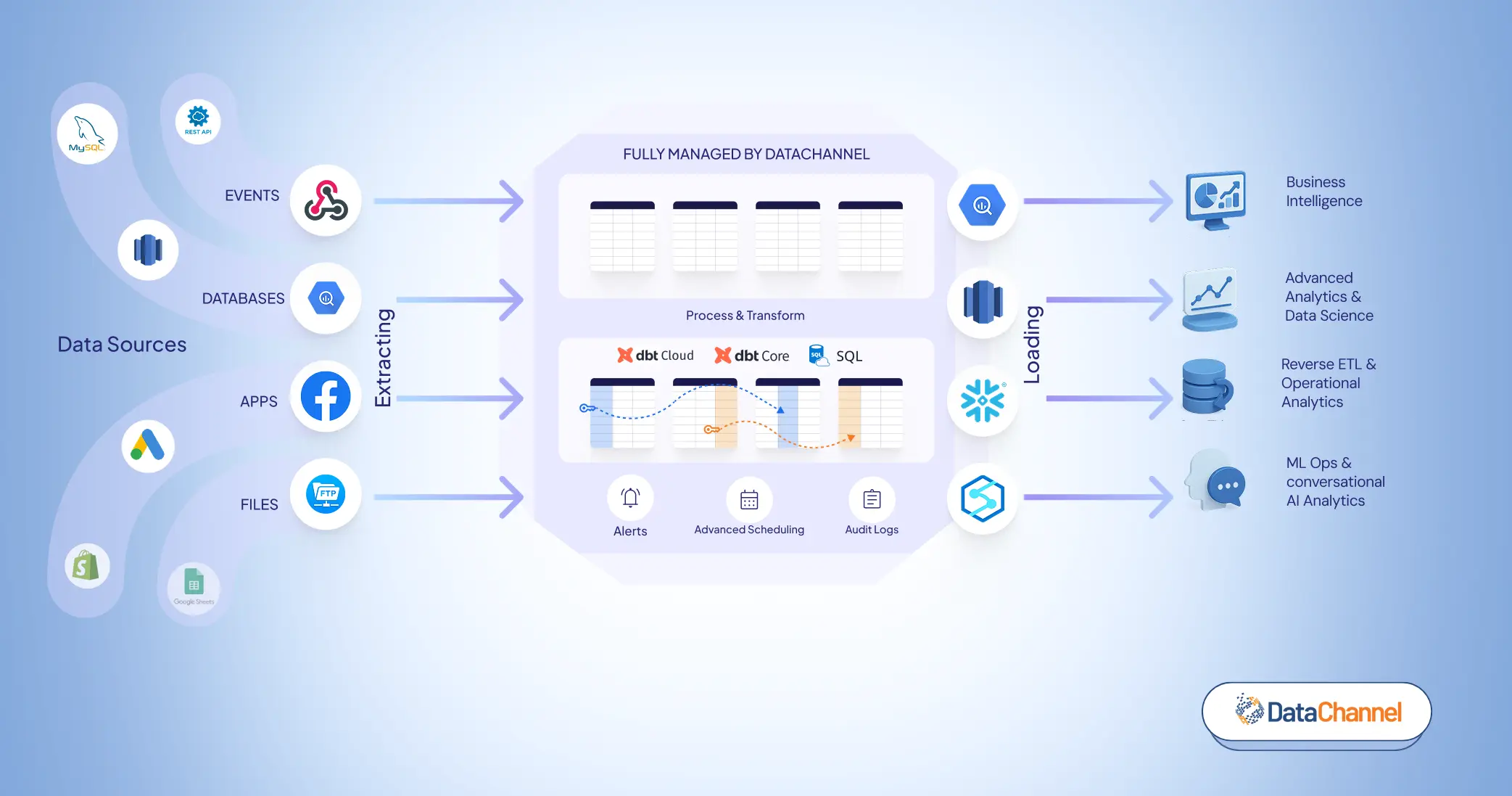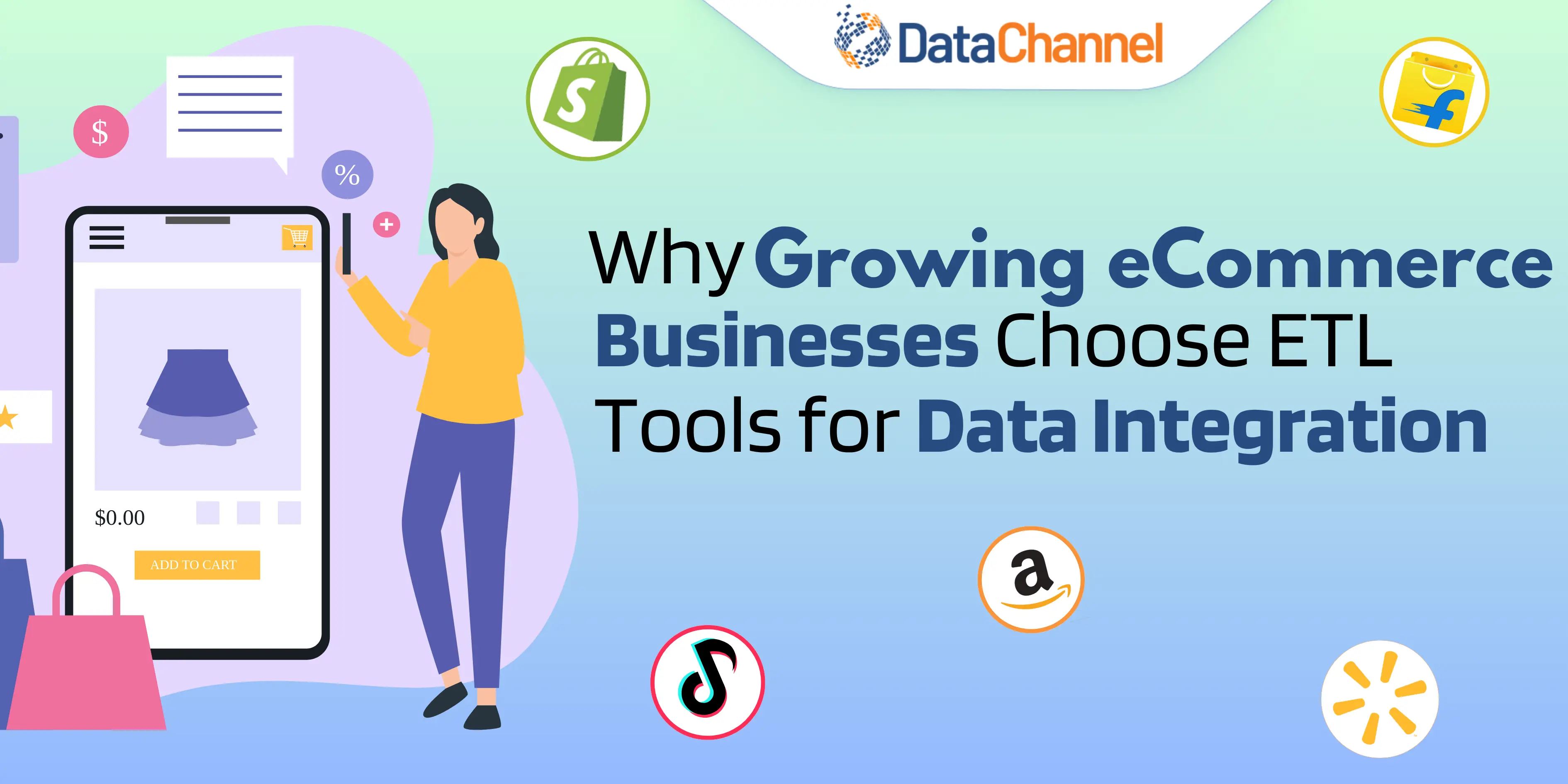
Importance of ETL in Business Intelligence

Table of Contents:
- BI and businesses today
- The potential of ETL and BI together
- ETL Applications within BI Teams
- Gain Momentum with Our Integrated ETL & Reverse ETL Solution
Business intelligence is a concept that companies are leveraging to find actionable insights into business operations, risks, and opportunities. The first step to get started with business intelligence is - to integrate data effectively. This is why companies are adopting ETL tools – to integrate their data and centralize it in a single platform.
Extract-Transform-Load, as the name suggests, extracts your data from different sources, transforms it into different formats for various use cases, and loads it into a data warehouse/data lake/other data destinations of your liking. Built on top of an effective ETL operation, BI systems can provide historical, current, and predictive views of a business’s operations, most often using data from a centralized warehouse, helping the user make better decisions.
In this article, we explore business intelligence, how it is being used by data specialists and what is the importance of ETL in business intelligence frameworks.
BI and Businesses Today
Business intelligence is the framework that lets a user analyze business data and visualize it using reports, graphs, comparisons, dashboards, etc. It includes major elements such as data storage, business analytics, OLAP, visualization, etc. and is a necessity for organizations to make informed decisions.

Many people state it is a “core value” for their organizations. With new data, there is also scope for newer opportunities, and BI helps discover that.
Let’s have a look at some key benefits that can be leveraged with BI:
- Since ETL enhances your overall data visibility, business intelligence frameworks can be used to plan optimal resource allocation within your business. A good example would be using BI to get historical patterns from datasets. This can help users find predictive high or low-demand phases. With BI tools, you can make better decisions related to personnel, sales, investments, marketing, etc.
- Companies can bring in improvements in reporting, since implementation of BI tools lets data get analyzed faster and insights are generated more precisely, compared to manual methods.
- ETL effectively improves your data quality, which can be utilized by BI tools for different purposes, such as understanding customer trends, optimizing operational efficiency, increasing user satisfaction, enhancing business performance and much more.
- You get a competitive edge over your competitors when you uncover new relationships in your data, often pinpointing features that make you stand out from the rest of the market. Gaining traction is easy when you know your star feature, along with figuring out where you can bring in improvements to your product.
The Potential of ETL and BI Together
With cloud platforms operating as the heart of any data architecture, companies are transferring their legacy data into the cloud data warehouses, which they transform to find answers to complex business problems. What companies are doing – leveraging ETL to send data to warehouses, then working on BI mechanisms to find insights at a deeper level. The key benefits of ETL-BI are:
- Discovering new relationships between datasets: BI tools can help unravel new patterns within your datasets. With ETL, you get access to data on a deeper level, which is then used by BI tools to get better insights.
- Enhanced data quality, visibility and accessibility: ETL smoothens out data discrepancies and provides transparent data to end-users. In addition, BI tools are used to improve visibility into the action plan for business operations, optimizing your data strategies.
- Real-time view into critical business activities: ETL-BI helps monitor business operations on the go, with the ability to fix and improve on mistakes, all fueled by high-level insights.
- Leveraging predictive analysis via historical/current data: With deeper insights into consumer behavior, ETL-BI produces information that ranges from descriptive (dashboards, reports) to predictive (future trends, scope).
- Data Transformations help remove inconsistencies in data: Advanced transformations take care of missed data and deletes unused data, resulting in faster data processing.
- ETL-BI makes coherent data available within cross-functional business teams, which allows better decision making. Now, it is not a necessity to go to data engineers to get updates on reports, find specific business information, current market trends, etc.
.png)
Developments in traditional BI with the advent of Reverse ETL
Increasingly businesses are using Reverse ETL to sync data from warehouses to various business apps and tools, providing truly democratic data visibility. Today, static traditional BI has been replaced by self-serve BI tools, essentially helping cross functional teams get access to data and run analytics on them, without reaching out to tech teams for help. Business intelligence models also introduced “in-memory” processing of data, which helped overcome long query execution times, substantially speeding up delivery of reports.
Gain Momentum with DataChannel's Integrated ETL & Reverse ETL Solution
- 100+ Data Sources. DataChannel’s ever-expanding list of supported data sources includes all popular advertising, marketing, CRM, financial, and eCommerce platforms and apps along with support for ad-hoc files, google sheets, cloud storages, relational databases, and ingestion of real-time data using webhooks. If we do not have the integration you need, reach out to our team and we will build it for you for free.
- Powerful scheduling and orchestration feature with granular control over scheduling down to the exact minute.
- Granular control over what data to move. Unlike most tools which are highly opinionated and dictate what data they would move, we allow you the ability to choose down to field level what data you need. If you need to add another dimension or metric down the line, our easy-to-use UI lets you do that in a single click without any breaking changes to your downstream process.
- Extensive Logging, fault tolerance, and automated recovery allow for dependable and reliable pipelines. If we are unable to recover, the extensive notifications will alert you via slack, app and email for taking appropriate action.
- Built to scale at an affordable cost. Our best-in-class platform is built with all ETL best practices built to handle billions of rows of data and will scale with your business when you need them to, while allowing you to only pay for what you use today.
- Get started in minutes. Get started in minutes with our self-serve UI or with the help of our onboarding experts who can guide you through the process. We provide extensive documentation support and content to guide you all the way.
- Managed Data Warehouse. While cloud data warehouses offer immense flexibility and opportunity, managing them can be a hassle without the right team and resources. If you do not want the trouble of managing them in-house, use our managed warehouse offering and get started today. Whenever you feel you are ready to do it in-house, simply configure your own warehouse and direct pipelines to it.
- Activate your data with Reverse ETL. Be future-ready and don’t let your data sit idle in the data warehouse or stay limited to your BI dashboards. The unidimensional approach toward data management is now undergoing a paradigm change. Instead, use DataChannel’s reverse ETL offering to send data to the tools your business teams use every day. Set up alerts & notifications on top of your data warehouse and sync customer data across all platforms converting your data warehouse into a powerful CDP (Customer Data Platform). You can even preview the data without ever leaving the platform.

Try DataChannel Free for 14 days










